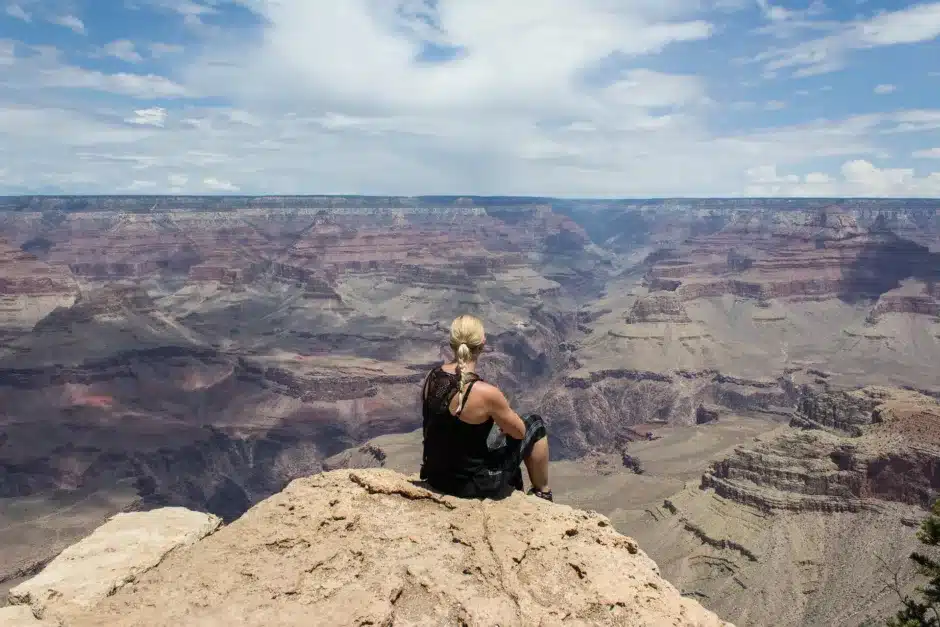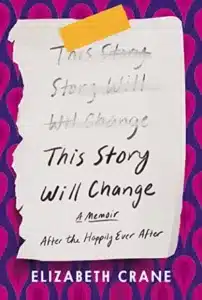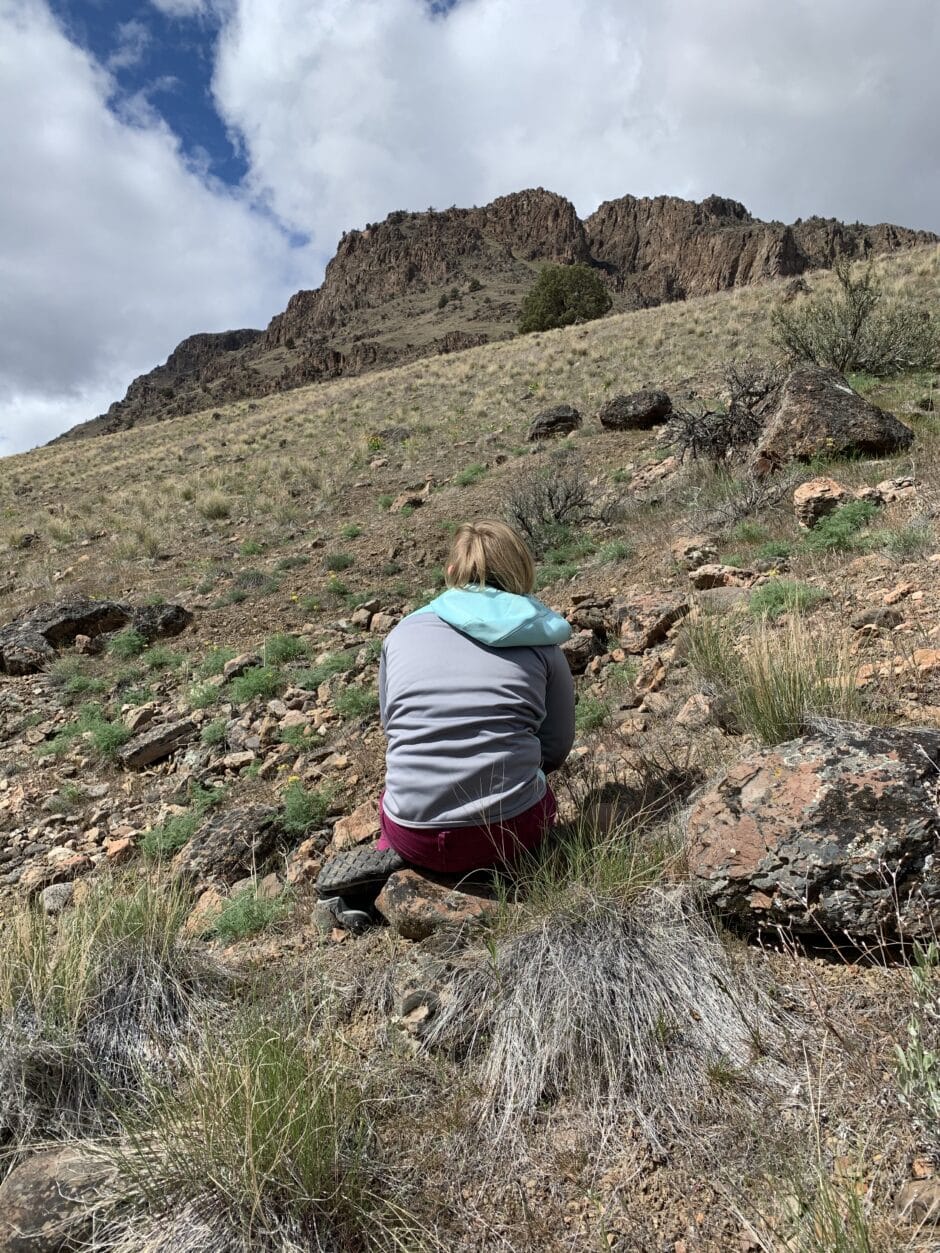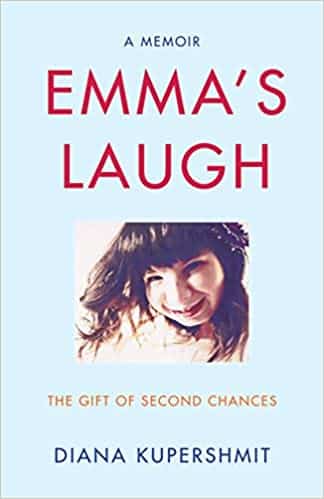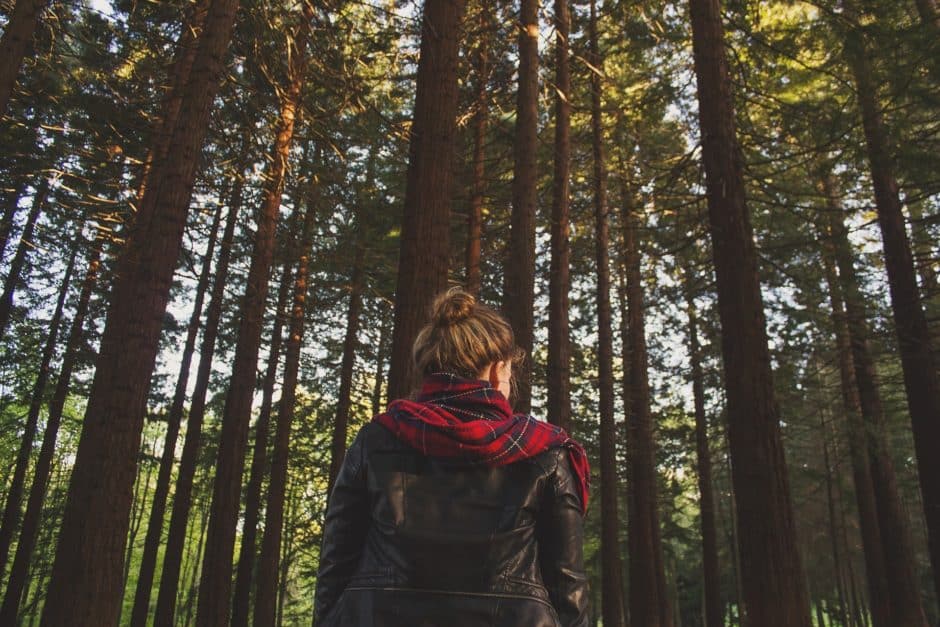I didn’t want to hike the Grand Canyon.
April is the golden time in Phoenix, when the sun burns just warm enough for hike-and-pool days but not so hot to warrant an escape up north. After a morning trek up Piestewa Peak, Kyle and our friend Andy relax on a couple pool chairs, sipping cold beers and scheming up an adventure for the dry-heat days ahead. Next to them, I sit cross-legged in my pool chair with a red pen and stack of papers in my lap, going through my most recent essay and making up for the writing time I lost to the morning hike.
Andy insists on the Grand Canyon, declaring the national park his favorite place in the world.
Kyle and I look at each other, both thinking the same thing: How could the Grand Canyon be his favorite place in the world? A year earlier we had walked the rim a year, and we agreed that the crater looked the same no matter where you stood. We had taken several pictures of the view, glad to finally see the iconic landmark, but we weren’t itching to go again.
But Andy doesn’t let up. “You have to hike down it to get the full experience. You can’t just walk the rim and call it a day.”
This convinces Kyle, and I just smile at the thought of having a weekend to myself at the apartment, locked indoors by the summer heat, writing without distractions. I don’t care to go on Andy’s adventure to prove the Grand Canyon has more to it. The trip involves camping…outside…and hiking down dozens of switchbacks before hiking right back up, a twisted order of doing things.
Kyle understands. Camping and hiking are his things.
Writing is mine.
I didn’t know what I’d write while the boys adventured at the Grand Canyon, but I knew I needed that time block to see where it took me.
#
Andy tells us a statistic – of the three million people who visit the Grand Canyon every year, only one percent hikes down in it.
Being different is Kyle’s thing. Being with people, keeping a full social calendar, exploring, traveling – these are all Kyle’s things. My curious, extroverted, nature-seeking husband keeps an eye out for the exciting and the new.
I am an introvert and home body by nature, and my husband’s favorite things often make me anxious. I want to be adventurous for him and experience the things he most enjoys, but I also want to be true to myself. All I want to do is write. Ever. Always.
#
This writing-or-experiencing debate has come up in different ways since I first moved in with Kyle, back in Iowa. One of the questions then: Do I spend the day writing or join Kyle and our friends tailgating for the Iowa State game? Kyle always invited me to go, but the thought of giving up a full day of writing to play drinking games with people we hung out with all the time made me cringe. His friends often asked him about me if I didn’t go, and part of me wished I was closer with them.
One of those Saturdays, I joined him at eight a.m. for the tailgate and brought my backpack. I planned to sit with the group for an hour, get some face time in, then when they’d all get too tipsy to notice I’d walk off to a coffee shop and write.
But I got to talking to the girls at the tailgate. Most of them, like me, came into this group because our significant others all partied together in college. Chatting with them, I understood that I wasn’t the only one who felt out of place. Like me and my writing, they each had a life of their own beyond this day of tailgating and drinking games. The writer in me was curious to know more about them.
So I took my backpack off and challenged them to a game of flippy cup.
I can’t deny that my most compelling stories and memories have happened when I tried out Kyle’s things, even if I slightly dreaded them. Most often I end up beyond glad that I joined him. With a new perspective, I come back ready to write and create with all the new spontaneity and spark within me.
Which is what I’m thinking about when I finally give in after Andy’s umpteenth request. I desperately want to write for a weekend, but the more Andy builds it up the more curious I become about what the Grand Canyon looks and feels like when you go below the surface. I have a feeling it might be life-changing, like most of those experiences I initially dread because they force me out of my comfort zone.
The week of the trip, I decide to embrace the adventure – I look forward to the camping, the backwards hiking, all of it. I make a grocery store run and gather energy bars and ingredients for trail mix. I tell everyone at work about my exciting weekend ahead. If I’m not going to spend the time writing, I am going to have fun with what I choose to do instead.
#
On a Friday evening in mid-May, we leave the sweltering heat of Phoenix and arrive at our campsite in Flagstaff two hours later, what feels like a different part of the world. The wind reminds me of below-zero wind chill days in the Midwest, although thankfully, the temperature is a kinder fifty degrees.
Kyle and Andy fight the weather to get the tents up, then we drive into town so the guys can reward themselves with Flagstaff’s craft beers. I enjoy a hard kombucha, clinking their glasses and cheering to my first real camping adventure.
No part of me wants to camp the night before a twelve-mile hike. I don’t sleep. The wind provides a nice white noise but its shattering gusts keep anyone from sinking into a dream. I lie in the tent uncomfortable and nervous, knowing what an unpleasant person I am without a good night’s sleep. We are all in for a long day together when the sun comes up.
#
After so many tailgates in Iowa, I still caught myself referring to the group as “Kyle’s friends.” I had gotten to know all these girls, but we still had our own friends and our own lives and we never got together outside of tailgates. Unlike the guys, we didn’t have four years at Iowa State to bond us.
So I started something – Girls of the Crew, for all of us girlfriends who came to the group by default – and it took off. Everyone picked something they wanted to do – dessert and wine night, bounce center and tumbling, brunch and mimosas, housewarming parties. Everyone freaking loved it, and we all suddenly belonged in the group that wasn’t ours.
The week before I moved to Arizona, the girls threw me a going-away dinner. After I’d moved, they mailed me a home decor sign they’d made at one of their girls group dates since I’d left. Girls of the Crew still thrives today, four years later, and I Skype in for happy hours, baby showers, and girls’ nights.
If I had stayed home from those tailgates, I might not have those ten extra girlfriends who add a world of color to my life, who ask me every time we meet how my book is coming.
Socializing, I started to realize, gave me an opportunity to talk about my writing, to speak up about the project I’m working on, while connecting with the audience whom my work is largely intended for. Having friends I’m close with allows me the space to go deeper about my passions rather than trying to impress them by sharing details about a job I don’t care about.
I guess socializing can kind of be my thing, too.
#
At five a.m., we pack up the tents and drive the rest of the way to the Grand Canyon. A hot cup of coffee makes up for the windy, sleepless night. I spend the thirty-minute car ride combining almonds and peanuts and dried cranberries and banana chips to make the perfect trail mix.
The top of the Grand Canyon feels as bitter cold as sleeping in the tent in Flagstaff. We start our hike wearing leggings, long sleeves, and hats, but after about a half hour of descending switchbacks, we start sweating and peeling layers. The sun grows warmer the deeper we go, poking through and kissing our skin. We descend for four-and-a-half miles before a one-and-a-half-mile flat stretch to Plateau Point.
If I stayed home, I’d still have one image of the Grand Canyon – the same view from the rim that the other ninety-nine percent of tourists have.
If I stayed home, I’d be left wondering why Andy deemed this his favorite place in the world.
If I stayed home, I might have the beginnings of another essay about something from my past scribbled in a notebook.
But here I am, six sweaty miles down into the Grand Canyon, with something new to write about. The sleeplessness from the night before – and the fact that I left my perfect trail mix in the car – is forgotten, replaced by the adrenaline of truly seeing this holy ground for the first time. My surroundings look different from six miles in, from the lens of curious-writer-on-a-hike rather than uncomfortable-hiker-who-wants-to-be-writing.
From the edge of Plateau Point, I try to stand upright and take in the immensity of my new view – a 360-degree backdrop of vibrant rock, the Colorado River flowing miles below me, its blueish-green stream popping up from the tan rocks it weaves through – but my legs quiver from the work it took to get there. Six miles downhill is not the way our hikes usually begin. It is, however, what it takes for me to realize what makes the Grand Canyon so, well, grand.
That view carries me back up to the top, six miles of constant stair-stepping that’s about triple the Piestewa Peak hike we did a few weeks earlier. The three of us space out as we each grow more ambitious, then more tired, and more sore. When we think we’re close to the top, I see Kyle start running the rest of the way. I’m not far behind him, and I’m at a strong finishing pace. Each leg feels like it belongs to an elephant as I continue trudging step after step. But I feel strong, healthy, vibrant, and when I see Kyle cheering for me at the top, I’m filled with confidence. If I can do this, I can do anything. Maybe even finish writing a book.
There’s writing, and then there’s living a life worth writing about.
Michelle Chalkey is a Phoenix-based writer currently working on her first book, a collection of personal essays about her quest for confidence as an insecure twentysomething. Michelle’s work has been published in The Sunlight Press, The Mindful Word, Across the Margin, The Book of Hope Anthology, and Women’s Running Magazine. You can follow her on her website at michellechalkey.com, or keep up with her reading list on Instagram, @MichelleChalkeyWriter.
***
Wondering what to read next?
This is not your typical divorce memoir.
Elizabeth Crane’s marriage is ending after fifteen years. While the marriage wasn’t perfect, her husband’s announcement that it is over leaves her reeling, and this gem of a book is the result. Written with fierce grace, her book tells the story of the marriage, the beginning and the end, and gives the reader a glimpse into what comes next for Crane.
“Reading about another person’s pain should not be this enjoyable, but Crane’s writing, full of wit and charm, makes it so.”
—Kirkus (starred review)
***

